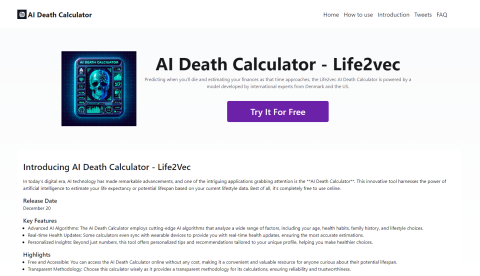The developers of a “AI death calculator” that can, well, predict when you’ll die, have issued a dire warning to anybody curious about how long they will live.
The Life2vec AI chatbot was revealed in December by academics from Denmark. They claimed that the computer can precisely forecast your wealth as well as your life expectancy.
While the original chatbot has not been made available to the public, other imitation applications that seem to be frauds are now making an appearance on the internet.
The group has issued a warning, claiming that phony websites that “have nothing to do with us and our work” have been constructed by scammers to mimic the chatbot.
Therefore, they caution.
They say the original software is private as it contains sensitive data and is stored at Statistics Denmark – so the bot cannot be accessed via the internet.
On their site, they urge readers to be careful.
‘We are aware of Life2vec social media accounts, and there is at least one fraudulent website,’ they said. ‘We are not affiliated with these or any other entities that claim to use our technology.’

Fraudulent websites may be intended to steal data and other sensitive information, such as email addresses, phone numbers or credit card details.
They could even be used to spread malware.
Life2vec was created by scientists in Denmark and the US.
They fed data from Danish health and demographic records for six million people who were aged between 35 and 65 into the model.
Around half of the participants died between 2016 and 2020. However, researchers found that Life2vec predicted who would die and who would live with an accuracy of 78%.
The AI used information such as income, profession and medical history to determine how long people will live, as well as social ‘life events’ they may experience in the years to come.
‘It could predict health outcomes,’ said Sune Lehmann, a professor at the Technical University of Denmark (DTU) and lead author of the Life2vec study.
‘So it could predict fertility or obesity, or you could maybe predict who will get cancer or who doesn’t get cancer.
‘But it could also predict if you’re going to make a lot of money.’





